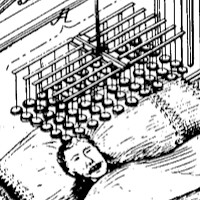Election History (November 4)

With the very recent election of the first African-American President of the United States, I had cause to sit back and look at the history of the election process throughout history. Truly, November 4, 2008 is a landmark date in United States history. Less than one hundred years ago, Barack Obama would not even have been given the opportunity to run for President on a major ticket, and surely, he would not have been elected.
First, let’s look at the boring information on how the election process works. According to Article II of the US Constitution, the President and Vice President are elected via an indirect vote of the populace, and by direct vote of the Electoral College. The reason for the dual vote is simply, a compromise. Some drafters wanted Congress to choose, others wanted the national vote. The Electoral College is comprised of a number of delegates from each state that is equal to the number of Senators and Representatives in Congress.
The President and Vice President were chosen separately prior to the 12th Amendment. In other words, without Amendment 12, McCain could have been President with Biden as his Vice President based on popular vote. This situation did actually occur frequently in the early years of the nation. In election of 1800, Thomas Jefferson was elected President, but Alexander Hamilton and Aaron Burr tied for the position of Vice President, based on electoral votes. Hamilton had great influence over the House of Representatives and was given the position. Burr, of course, challenged Hamilton on the election and that challenge lead to the famous duel in 1804.
With the ratification of the 12th Amendment, however, the Presidential candidates select their choices for Vice President to run as a “ticket,” hoping to strengthen their political stances where they find themselves lacking. By way of example, Obama selected Biden to appeal to those people who were concerned with Obama’s lack of experience.
In 1865, the 13th Amendment to the Constitution abolished slavery. In 1866, Congress passed (over the veto of the President) the Civil Rights Bill which granted citizenship to blacks. This meant that blacks were eligible to vote in elections. In 1867, Congress passed the 14th Amendment, thereby guaranteeing blacks the rights granted by the Civil Rights Bill. Frederick Douglass supported Ulysses S. Grant in the 1870 election and thereby assisted in the ratification of the 15th Amendment, guaranteeing the right for blacks to vote. The first black to be elected to the Senate was Hiram Revels of Mississippi, and the first black to be elected to the House was Joseph Rainey of South Carolina.1 Douglass, himself, would be nominated for the position of Vice President on the Equal Rights Party ticket headed by Victoria Woodhull in 1872. He was the first black man to be nominated for the office.
Fastforwarding a bit through the nation’s history, in 1920, women finally gained the right to vote. With the passage of the 19th Amendment, women were legally able and encouraged to hit the polls and make their voices heard. The first woman to vote in the US under the 19th Amendment was Mrs. Marie Ruoff Byrum. Sadly, during the debates during black-suffrage, Frederick Douglass lost the support of women who were upset they had not been included in the legalese of Amendment 15. Douglass responded to their protests by stating, “When women because they are women are dragged from their homes and hung upon lampposts, ..then they will have the urgency to obtain the ballot.”2 Sadly, the women at that time—Elizabeth Cady Stanton, among others—did not agree with him and chose to speak out against the Civil Rights Bill and the 14th and 15th Amendments.
The year1964 marked a rather important day for voters—at least voters in Washington, D.C. It was the first time those people had the opportunity to vote. Washington, D.C. has no vote in Congress, itself. There is no Senator, there is, however, a non-voting Representative. Interestingly, the US Territories also have non-voting representatives, but they are not subject to the taxes and federal laws that the States are. Washington, D.C., however, is. According to the Wikipedia article, Washington, D.C. paid more money in federal taxes in 2007 than was collected from 19 states. To make it a state violates the idea of a separate capitol. To tax the residents, however, is taxation without representation. In 1961, the 23rd Amendment granted the right to vote to those living in Washington, D.C., granting them three Electoral College votes.3
Every vote counts. In order for the voting process to work the way it was intended to work, every person who is eligible to vote must. A majority vote tells the Electoral College the will of the people and they vote based on the desires of their states. Usually. There have been three elections in which the Electoral College made their choice for President because none of the candidates received the majority of the popular vote. According to the Wikipedia entry, those elections were 1876 (Rutherford B. Hayes), 1888 (Benjamin Harrison), and 2000 (George W. Bush).
First, let’s look at the boring information on how the election process works. According to Article II of the US Constitution, the President and Vice President are elected via an indirect vote of the populace, and by direct vote of the Electoral College. The reason for the dual vote is simply, a compromise. Some drafters wanted Congress to choose, others wanted the national vote. The Electoral College is comprised of a number of delegates from each state that is equal to the number of Senators and Representatives in Congress.
The President and Vice President were chosen separately prior to the 12th Amendment. In other words, without Amendment 12, McCain could have been President with Biden as his Vice President based on popular vote. This situation did actually occur frequently in the early years of the nation. In election of 1800, Thomas Jefferson was elected President, but Alexander Hamilton and Aaron Burr tied for the position of Vice President, based on electoral votes. Hamilton had great influence over the House of Representatives and was given the position. Burr, of course, challenged Hamilton on the election and that challenge lead to the famous duel in 1804.
With the ratification of the 12th Amendment, however, the Presidential candidates select their choices for Vice President to run as a “ticket,” hoping to strengthen their political stances where they find themselves lacking. By way of example, Obama selected Biden to appeal to those people who were concerned with Obama’s lack of experience.
In 1865, the 13th Amendment to the Constitution abolished slavery. In 1866, Congress passed (over the veto of the President) the Civil Rights Bill which granted citizenship to blacks. This meant that blacks were eligible to vote in elections. In 1867, Congress passed the 14th Amendment, thereby guaranteeing blacks the rights granted by the Civil Rights Bill. Frederick Douglass supported Ulysses S. Grant in the 1870 election and thereby assisted in the ratification of the 15th Amendment, guaranteeing the right for blacks to vote. The first black to be elected to the Senate was Hiram Revels of Mississippi, and the first black to be elected to the House was Joseph Rainey of South Carolina.1 Douglass, himself, would be nominated for the position of Vice President on the Equal Rights Party ticket headed by Victoria Woodhull in 1872. He was the first black man to be nominated for the office.
Fastforwarding a bit through the nation’s history, in 1920, women finally gained the right to vote. With the passage of the 19th Amendment, women were legally able and encouraged to hit the polls and make their voices heard. The first woman to vote in the US under the 19th Amendment was Mrs. Marie Ruoff Byrum. Sadly, during the debates during black-suffrage, Frederick Douglass lost the support of women who were upset they had not been included in the legalese of Amendment 15. Douglass responded to their protests by stating, “When women because they are women are dragged from their homes and hung upon lampposts, ..then they will have the urgency to obtain the ballot.”2 Sadly, the women at that time—Elizabeth Cady Stanton, among others—did not agree with him and chose to speak out against the Civil Rights Bill and the 14th and 15th Amendments.
The year1964 marked a rather important day for voters—at least voters in Washington, D.C. It was the first time those people had the opportunity to vote. Washington, D.C. has no vote in Congress, itself. There is no Senator, there is, however, a non-voting Representative. Interestingly, the US Territories also have non-voting representatives, but they are not subject to the taxes and federal laws that the States are. Washington, D.C., however, is. According to the Wikipedia article, Washington, D.C. paid more money in federal taxes in 2007 than was collected from 19 states. To make it a state violates the idea of a separate capitol. To tax the residents, however, is taxation without representation. In 1961, the 23rd Amendment granted the right to vote to those living in Washington, D.C., granting them three Electoral College votes.3
Every vote counts. In order for the voting process to work the way it was intended to work, every person who is eligible to vote must. A majority vote tells the Electoral College the will of the people and they vote based on the desires of their states. Usually. There have been three elections in which the Electoral College made their choice for President because none of the candidates received the majority of the popular vote. According to the Wikipedia entry, those elections were 1876 (Rutherford B. Hayes), 1888 (Benjamin Harrison), and 2000 (George W. Bush).
You Should Also Read:
The 15-1/2 President (February 18, 1861)
I Have a Dream... (August 28, 1963)
Dr. Blackwell: Medicine Woman (January 23, 1849)

Related Articles
Editor's Picks Articles
Top Ten Articles
Previous Features
Site Map
Content copyright © 2023 by Christa Mackey. All rights reserved.
This content was written by Christa Mackey. If you wish to use this content in any manner, you need written permission. Contact Lane Graciano for details.







